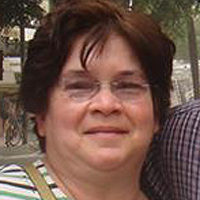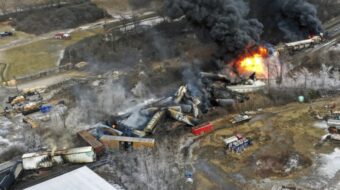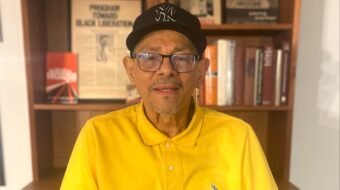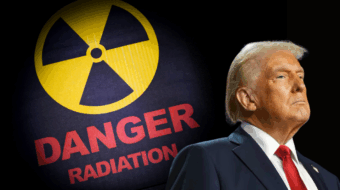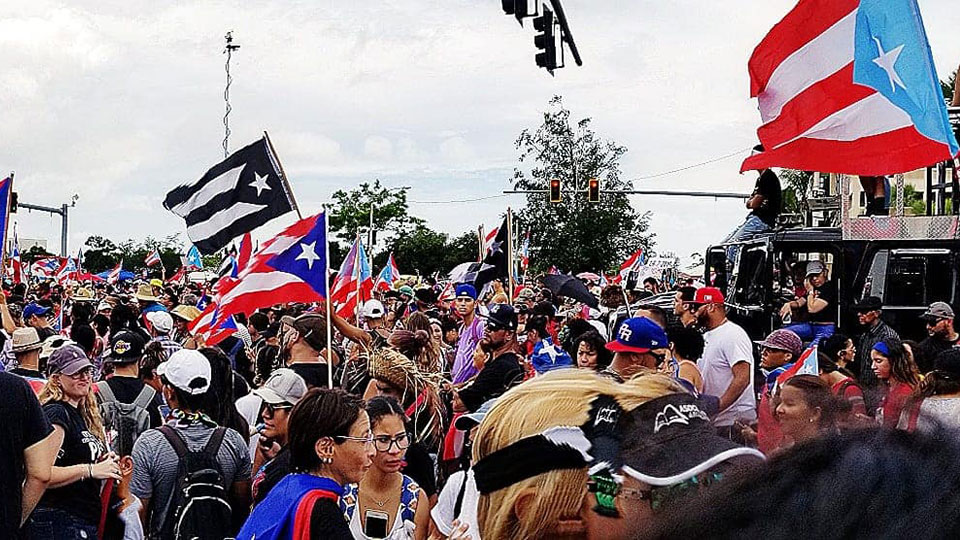
Once again Puerto Rico is facing the threat of another hurricane, this one named Dorian. It comes at a time when the island has not nearly recovered from the devastation of Hurricane Maria and the related criminal neglect of President Trump two years ago.
As this new storm approaches, however, the people of Puerto Rico are preparing to meet its threat with some important victories under their belts. Chief among those victories was the uprising that toppled a criminally negligent governor. Another victory is reflected in the ability they have shown to meet future challenges.
People’s Assemblies that by their very nature challenge some of the worst aspects of U.S. colonialism are flourishing on the island and among the Puerto Rican diaspora on the U.S. mainland. Puerto Ricans from every walk of life on the island and on the U.S. mainland are involved in an unprecedented mobilization to create the conditions that will never allow political corruption, whether it comes from a president like Trump or from criminally negligent leaders on their island, to hamper their ability to handle what nature throws at them. They are winning support for their quest from the labor movement and many of its allies.
The triumphant uprising in Puerto Rico at the end of July that ousted Ricardo Rosselló from the governor’s mansion signified a historic, transformative moment in the political life of the country.
A corrupt regime and system marked by political repression and gross, criminal neglect of the people’s needs, pushed Puerto Ricans over the brink and into the streets in a historic rebellion. The movement and the uprising continue to be diverse, broad, and unified, and include advocates of the different status relationships with the United States – commonwealth, statehood, and independence.
Militant labor unions led the massive protests, which drew in and activated hundreds of organizations and hundreds of thousands of citizens. They ranged from motorcycle clubs to throngs of youth inspired by rappers and popular artists, and students from universities and high schools. They included champions of public education led by the militant teacher’s union, parents, and neighborhood organizations.
Today, here on the mainland, some of the strongest allies and community and labor leaders from the Puerto Rican diaspora are coming together to exchange ideas and participate in the fight for a better future for Puerto Rico.
In a meeting August 17 at the union headquarters of Service Employees International Union Local 32BJ (SEIU) in New York City, the leaders pledged to grow a strong network of support among their unions, communities, and organizations and to bring the continuing struggles in Puerto Rico into the national spotlight.
The gathering focused was on what can be done, now that Rosselló is gone, to assist the growing movement in Puerto Rico. This includes building support and raising awareness among activists and elected officials in the U.S. about the struggle for sovereignty and just recovery from Hurricane Maria and the economic and social crisis ongoing on the island.
Roberto Pagan, of Vamos4PR, a Puerto Rico support organization formed by SEIU 32BJ in 2016, said, “The July demonstrations (against Rosselló) were convened by unions, celebrities, feminist groups, community groups – organized in a national consensus throughout the island, not just San Juan.
“They raised the demand for resignation,” said Pagan, “but also other demands – remove La Junta (the unelected U.S. Congress Fiscal Control Board that has imposed severe austerity measures), audit the debt, and declare a state of emergency of male supremacist violence.”
Since Rosselló’s resignation in early August, the protests have evolved into provisional and regularly scheduled plebiscites, or popular assemblies, held in towns across the island. Puerto Ricans are organizing to build a democratic, transparent government and society, one responsive to the people, not the hated La Junta or the Wall Street banks and profiteers La Junta represents.
The energy, power, and passion of the protests have shifted to building, from the ground up, People’s Assemblies across the island. The populist meetings, usually held in shared outdoor spaces, are led by community, labor, and progressive leaders. Citizens are invited and encouraged to exchange ideas, experiences, and discuss how to address economic and social problems and improve their living conditions.
The gatherings represent participatory democracy, providing a platform for genuine democratic change in governance. They are also drawing in many people who previously had not participated in the political process. Assemblies take place weekly and have expanded to the Puerto Rican diaspora in the United States, which has been a lifeline for the island in the aftermath of Hurricane Maria.
The stateside people’s assemblies focus on providing support for the democratic and progressive movements emerging on the island to surmount the crushing debt and the austerity measures. These include rules imposed by La Junta recently to solve problems caused by over a hundred years of U.S. colonialist plunder on the island.
At the SEIU headquarters solidarity meeting in New York, the chant “Puerto Rico No Esta Solo!” (Puerto Rico is Not Alone!) was led by Figueroa Duran, organizer of 32BJ in the town of Caguas, Puerto Rico.
Vamos4PR has lobbied to repeal the PROMESA law which established La Junta. It has also organized educational forums and the financing of the watchdog group, Hedge Clippers. They are working to unmask the role of banks and hedge fund vulture capitalists that profit from the debt.
Their research studies explain how Wall Street banks exploit Puerto Rico’s economy and how much of the debt was obtained illegally. “The Junta members themselves have admitted that part of the debt is constitutionally illegal,” said Duran, a finding which has given impetus to the growing demand for an independent audit of the debt.
The Puerto Rican diaspora came together because they wanted to ensure the survival of Puerto Ricans on the island when Trump and the GOP Congress refused to fully fund disaster relief aid, according to Nicole Torres Bruno, from #CancelTheDebt.
The fight against the restructuring agreement for bondholders of the debt, known by the acronym COFINA is the focus of Bruno’s work. COFINA ensures vulture capitalists are paid off on the backs of the Puerto Rican working class.
Bruno urged participation in upcoming debt restructuring hearings that will determine funding for education, healthcare, and services for Puerto Ricans for the next 40 years. At stake is the healthcare of 900,000 Puerto Ricans who stand to lose Medicaid coverage at the end of September. A temporary grant that supplements inadequate Medicaid funding is scheduled to expire then.
What we are witnessing in Puerto Rico is inherently a decolonization process, said Natasha Bannan, of Latino Justice, a project of the Puerto Rican Legal Defense and Education Fund. It involves many actions and initiatives in the electoral, political, and social spheres of life.
“After 500 years of colonialism, there’s been a rebellion, an uprising, a revolution grounded in the political, economic and human rights crisis. Puerto Ricans are challenging the model of governance imposed on them and are redefining what their relationship will be with their government. Let’s not shy away from the very rebellious act that is democracy-building,” she said.
The largest demonstration in the country’s history had been boiling in a pressure cooker during the last twelve years, recounted Pagan. In 2007, for the first time, the Puerto Rico sales tax was set at 7 percent. It has since risen to 11 percent, with up to 5 percent going directly to pay debt bondholders.
Through years of wage freezes, lay-offs, and culminating in labor reform laws of 2017, the Fiscal Control Board has reduced pensions and curbed collective bargaining rights. These are ways in which profiteers collect on the odious debt on the backs of the Puerto Rican working class.
As a result, he said, the May Day demonstrations of 2017 and 2018 saw the highest number of marchers in decades, demanding initiatives proposed by various groups calling for an independent audit of the debt.
“The nefarious acts of FEMA, government functionaries awarding contracts to friends and corporations, lying about the death tolls, and internal governmental disputes accumulated. They led to leaks of the now-famous chats of lobbyists, contractors, the governor, and his staffers,” said Pagan.
“But Rossello’s ouster does not end the crisis Puerto Ricans live day-to-day. The debt repayment process continues and will determine the future of public services, and the future of generations in Puerto Rico.”

Among the initiatives proposed by the People’s Assembly process is a public discussion on the PROMESA law and the role of the Fiscal Control Board colonialist entities imposed to pay off the Wall Street bondholders. They are demanding the bankruptcy process and federal court hearings be halted until an independent audit of the public debt is completed.
The two-party system is also being challenged. “For decades it has functioned in favor of the privileged sectors, and an alternative is needed,” said Pagan. Efforts are underway to enroll a third party in the 2020 elections in Puerto Rico. The new Movimiento Victoria Ciudadana (Citizens Victory Movement), “will provide a progressive platform in the Puerto Rican elections,” he said.
The Green New Deal is also viewed as key to a just recovery for Puerto Rico. Ricardo Sepulveda, of Boricuas Unidos en la Diaspora said the environmental justice organization is engaged in talks with Congressional offices to implement green new deal legislation through community-led efforts. “It is not only about reaching 100 percent renewable energy and net-zero emissions, but also about social justice and economic justice,” he said.
Before leaving office, Rosselló, in complicity with the Fiscal Board, implemented policies that threaten the environment. The plan “Uso de Tierras 2020” converts vast public lands into urban, industrial, and military use, including 37,000 acres for metal extraction. This comes on top of coal ash dumping by the U.S.-based AES corporation, privatization of the airport, and laws facilitating investments by finance capital and bitcoin speculators.
The activists stressed the need to bring the issue of Puerto Rican sovereignty to a broader audience in the United States and to build support across the U.S. and the globe. “We have to be about continuing the struggle, making history at this turning point,” said Sepulveda.
The convening call for the People’s Assemblies on the island is “Bring your chair and your voice, we will build the country we deserve!” Puerto Ricans are now calling on their mainland allies to add their voices to this historic call to action.


